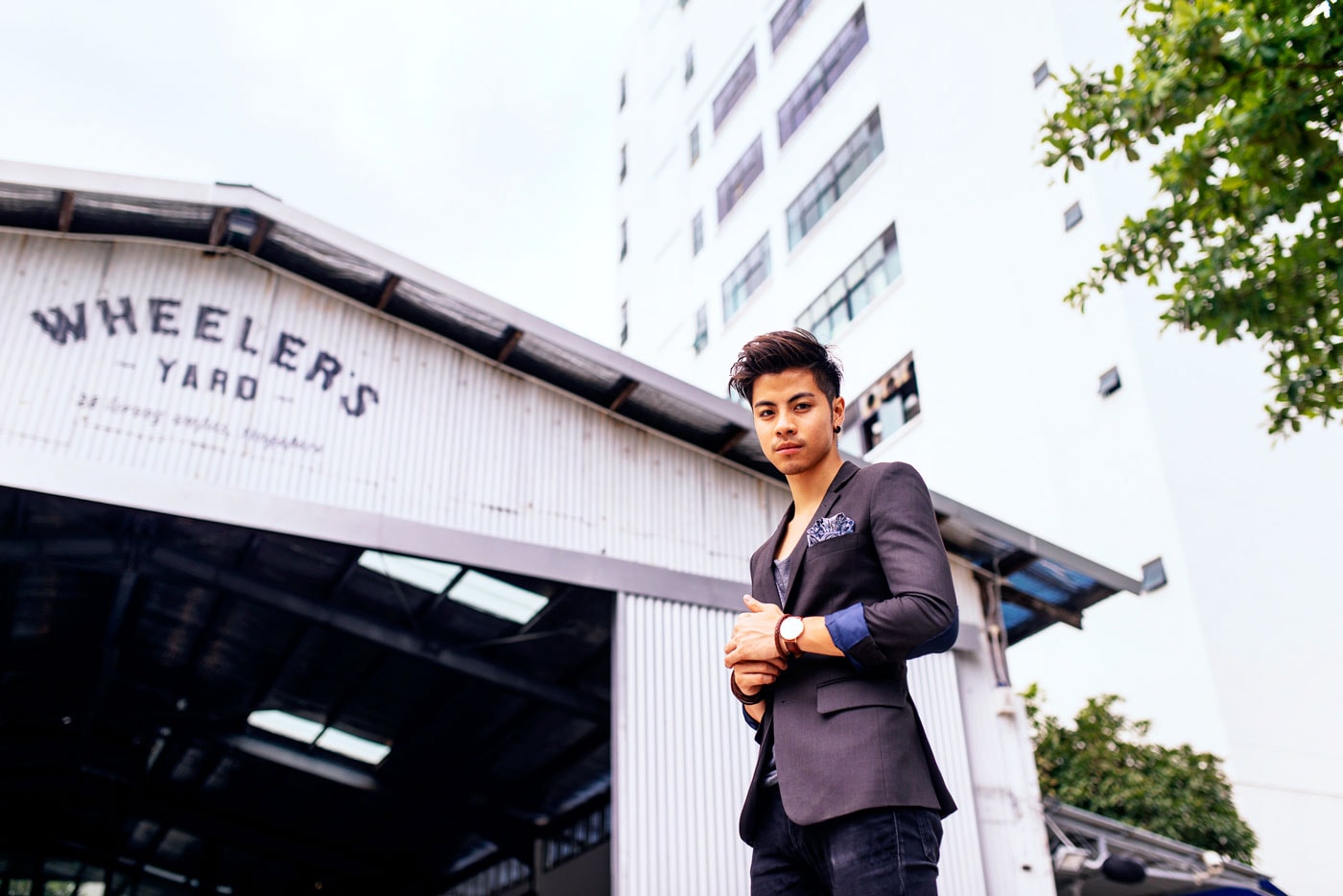Benjamin Kheng: Staying Ahead of the Game

Twenty-four-year-old Benjamin Kheng is not just a pretty face or sex on legs, but a talented multi-hyphenated artiste. At Wheeler’s Yard, attention follows Benjamin wherever he goes. Feeling unfazed, I ignore curious onlookers and giggling adolescent girls by placing our orders. The starry-eyed waitress is bursting with enthusiasm and gives us (or should I say Benjamin) VIP treatment. I knew my role for that day wasn’t confined to merely asking questions, but to also be a good sport by taking photographs for his adoring fans who wanted to cosy up to him.
As musician-singer-songwriter of the local indie band, The Sam Willows, Benjamin has performed overseas in Texas, Toronto, Perth and Seoul. A former national youth swimmer, Benjamin’s body of work goes beyond music and into both theatre and television acting. On stage, he has played a multitude of roles from the classic Shakespearean Romeo to local favourite recruit Ken Chow in the Ah Boys to Men: The Musical.
LEONARD CHANG: Which do you love more: music or theatre?
BENJAMIN KHENG: [long pause] Okay, I love both! It’s the truth. I started both around the same time too. In 2008, I was in fringe theatre works and was hooked ever since. Musicals are a blend of both theatre and music so I am not going to choose between them.
LEONARD: How is it like singing in a musical versus singing in a band?
BENJAMIN: It is more therapeutic. In the band, I enjoy my on-stage persona, but sometimes I just want to be someone else. The beauty of musicals is that I get to become my character and invite people into a new world.
LEONARD: Ever considered performing in an international musical?
BENJAMIN: Yes! That is definitely another dream of mine I hope to achieve. I would love to perform as Simba in The Lion King.
LEONARD: You have the Sam Willows, theatre roles and even an acting gig on television. How do you manage and prioritise your commitments?
BENJAMIN: It is really tough. The Sam Willows will always be the priority, I had to forgo a lot of personal acting gigs for the band. My personal decisions can affect the other band members, and I do not want to upset them. For a long period, none of us took a cut from the band’s earnings, as we reinvested everything. However, I have to make money to eat, so I take on ad hoc projects whenever I can. Acting is great because I love the craft and in the long run, I want to direct or produce theatres and films.
LEONARD: You were originally a swimmer, what made you choose to focus on music instead?
BENJAMIN: When I was younger, I was into swimming and music. I went to a Sports School, but I eventually got bored of staring at black lines in the water. So I began thinking of what I would rather be doing instead, and my mind kept returning to music. I did not know then if I would be good at it, but I knew I would be happy – if I at least tried.
LEONARD: At what point did you become aware that you might have a talent for music?
BENJAMIN: When I realised I have certain useful abilities for music. For example, I have relative pitch, which allows me to play a song after listening to it only once on the radio. It’s not perfect pitch, but close enough to allow me to learn music easily. I also discovered I have synesthesia, which is a rare mental phenomenon, where different senses interconnect to make new associations in the brain. In my eyes, each musical note has a different colour and gender.
LEONARD: Isn’t that distracting?
BENJAMIN: It can be, but I have learnt to filter it out. But since I realised it enables me to dissect a song immediately, it became a really useful ability for a musician. Both abilities went a long way to help me understand, and write music better.
LEONARD: A music career in Singapore is seen as a more difficult path. What helped you make that decision?
BENJAMIN: I worked at Lush 99.5 during my Polytechnic days as a radio presenter, which allowed me to meet with key players in the local media scene. That afforded me the opportunity to understand the feasibility of my musical aspirations.
LEONARD: Working in the media has opened doors for you?
BENJAMIN: Yes. It has played a major role. Being part of the media scene showed me the clockwork behind the scenes, how to get music out to the masses. As a musician, you cannot put out a single track and expect people to automatically flock to you. You have to market yourself, put up an EP, write press releases, design graphics and name cards, to make your work accessible to people. It is almost like being an artiste-entrepreneur.
LEONARD: Would you advise aspiring musicians to consider the technical and business aspects of the industry?
BENJAMIN: Definitely. While the countries and regions around us are massive, Singapore is very small, some of us just call it a scene. Many local artistes do not actively reach out to fans, preferring instead to stay within their comfort zones. Consumers are not going to search for local acts when they are already being bombarded by foreign mainstream music. If local artistes want success, it is going to have to be a two-way street. Our band is in a great place, straddling commercialism and being independent.
LEONARD: Do you get flak from other indie groups for being commercialised?
BENJAMIN: All the time! Whenever we get on mainstream media, we are known as an indie or folk group but in the indie scene, we are known as the big sell outs.
LEONARD: What was the biggest factor that contributed to the rise of the Sam Willows?
BENJAMIN: YouTube – as it provided an easy means to market ourselves. Our formation in 2012, coincided with the rise of social media in the local music scene. Our band rode that wave and got a lot of attention overnight. It was a great surprise to wake up and see a huge response to our initial videos.
LEONARD: It is unusual that all your band members have great vocals and are also musically inclined. Given the diverse backgrounds and influences, how does the band come to a consensus on anything?
BENJAMIN: It is very difficult because we are all highly opinionated. We had a lot of tension and friction in the beginning, but that’s how diamonds are formed. Our lengthy process involved a lot of personal vetoing, but that has always resulted in an end product we are proud to be a part of.
LEONARD: The band attended the South by Southwest (SXSW) Festival in Austin, Texas last year, and that was said to be the band’s big break. How was the experience?
BENJAMIN: When we got invited to the Festival, a lot of non-musicians assumed that we had gotten big. That is not true. The festival had 2000 bands playing in over 200 venues; it is incredibly difficult to become successful overnight there. A lot of bands make the mistake of overspending, only to perform for forty-five minutes to five people and struggle with technical issues. We sought advice on how to optimise our trip from other Singaporeans acts that have previously performed there. We maximised our exposure by extending it into a road trip, from Los Angeles to Texas and finally up to Toronto, Canada. We aggressively marketed ourselves, giving out flyers, thumb drives, and name cards. At the end of the day, it was more of a great learning and networking experience, rather than a big break.
LEONARD: Your cover of “All About That Bass” on YouTube recently crossed 350,000 views, more than double your previous record. Does this indicate that the Sam Willows is entering a different stage of its growth?
BENJAMIN: Our number of views is not a lot in the YouTube world. Singaporeans are more inclined to share Western or Korean music videos than any local ones. For “All About That Bass”, we decided to experiment by catering to the mainstream market and putting our own spin on a popular song. While I do not think it is a definite breakthrough, I am very excited that we are making solid progress in terms of reaching out to more fans.
LEONARD: You have a lot of female fans. How do you manage that?
BENJAMIN: I still don’t know how to! [laughs] Well, I am not super famous, so it is okay for now. I still get to make friends with my fans and follow up on their lives. Fandom is a double-edged sword. While it is great to have a following, as an artiste, it can make you complacent. Once you have a following, they are going to like you, no matter what you do, and you might sidetrack into mediocrity.
LEONARD: Have you gotten any unusual or outrageous request from your fans?
BENJAMIN: I got a letter once that contained a marriage proposal from a fan I know. Obviously, I rejected her politely, but that was really weird.
LEONARD: What do you do in your free time?
BENJAMIN: I rarely have free time. As a freelancer, I feel the need to always find work. But I do have my vices – I am a big console gamer on the Xbox. Otherwise, I write music. I am frequently penning down my thoughts, lyrics or a tune throughout the day.
LEONARD: How do you handle creative blocks?
BENJAMIN: I would consume more content to overcome it. You have to be a massive consumer of culture. The moment you block it out, you might become irrelevant. As an artiste, you are constantly pushing boundaries by challenging people’s mindsets of what is current and right. If you are not in the know, you will lose that touch.
LEONARD: Speaking of losing one’s touch, it has been three years since you completed National Service, ever considered returning back to studies?
BENJAMIN: That is a pressing question for me. Recently, I have been looking at the various schools that have offered me a place. However, this industry only looks at your portfolio, and not whether you have a degree. For now, I want to maximise my opportunities in the industry before furthering my studies. In the back of my mind, it is vital to have a fall back plan as the industry is too volatile. I may be doing well this year, but I can just as easily fall into obscurity the next.
LEONARD: Would you say social media contributed to this problem?
BENJAMIN: Yes, the barriers to enter this industry have flattened out, but on the other hand, we have social media to thank for our successes. Everyone can get out there, make a single chart-topping hit, and have their second single flop. For me, it is a question of how I can sustain my career. If my career falters, I will consider taking a few years off to complete my education. But I hope that does not happen, because I really love what I am doing.
LEONARD: What would you be doing if you did not become a musician?
BENJAMIN: I would do what you are doing. A journalist for Reuters maybe, or a photojournalist for National Geographic. Travel the world and tell stories; I love to tell a good story.
****
Edited by Yong Hui Yow and Wy-Lene Yap




